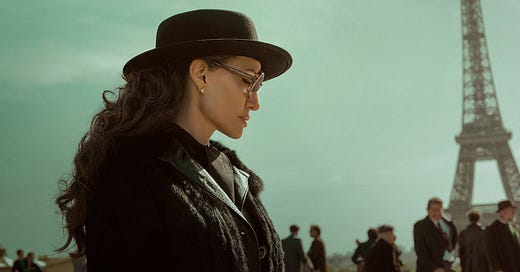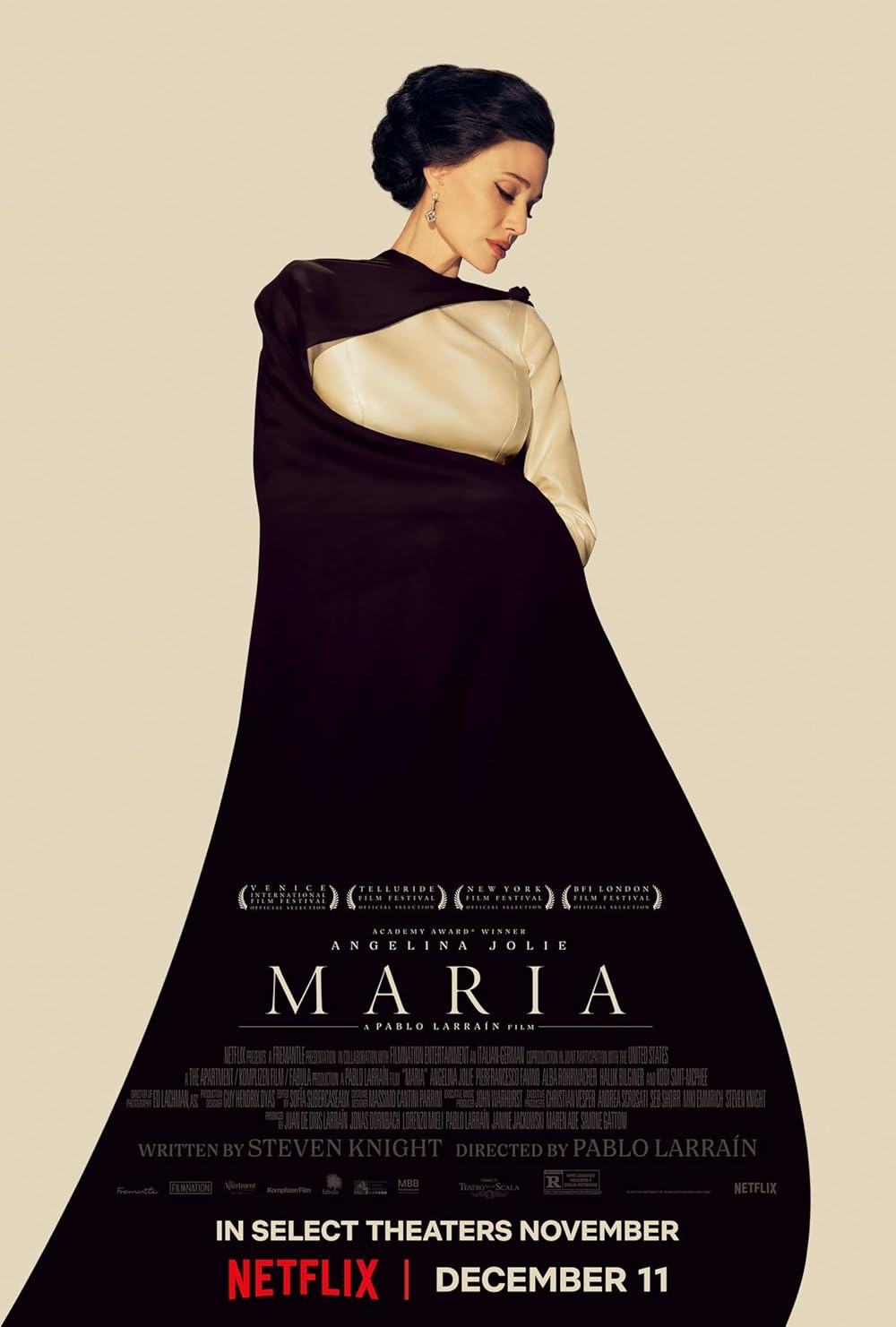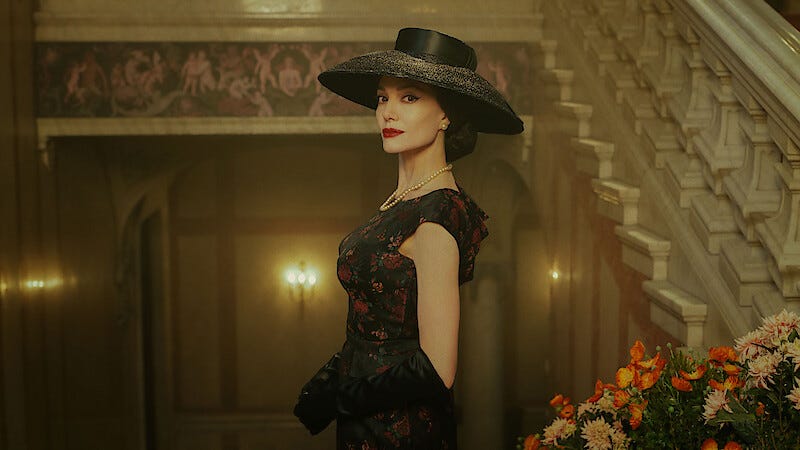Some Thoughts on Maria and My Love for Angelina Jolie
Jolie gets her best role in years as the legendary opera diva in a biopic that’s too timid with its subject.
By the time that Maria Callas died in 1977 at the age of 53, she hadn't sung in public in years. She lived the final years of her life largely in isolation in Paris, out of the public eye but still a fascination to the world. The grand diva of opera, nicknamed La Callas, was called the Bible of Opera by Leonard Bernstein, but even her die-hard devotees had admitted that her voice was not what it once was by the end of her career. In Pablo Larrain’s Maria, her final week of life is explored in a dreamlike state, with Callas hoping to figure out if she still has her true voice before her increasingly frail body gives out.
Chilean filmmaker Pablo Larrain has become the go-to director for biopics of misunderstood female icons of the late 20th century, headlined by actresses with their own public baggage that inevitably shapes how they play these indelible women. It’s one hell of a niche but both Jackie and Spencer have proven that he has what it takes. Maria, the third part of this trilogy, is the weakest entry in this canon, but it’s not without its intriguing details, as well as a fragile but commanding performance by the one and only Angelina Jolie.
(Image via Netflix.)
I’ve made no secret of my love of Angelina Jolie. I’ve long been a card-carrying member of Team Angelina, dating back to my pre-adolescent love of Tomb Raider then me and my sister discovering Girl, Interrupted at the perfect moment in our teenage years. When I became interested in celebrity culture, it was Jolie who I consistently gravitated towards. I was simply in awe of her work, specifically in how she moulded her image from one of the vampy bad girl to an elegant humanitarian who did more than walk the walk. But even I have to admit that her filmography is somewhat lacking. She’s an incredible talent who hasn’t always been given roles worthy of her abilities. For every Gia or Girl, Interrupted or Salt, there’s a The Tourist or Life or Something Like It. She’s also largely stepped away from acting to direct and focus on her charity work, which is vast, ambitious, and impactful. And then there’s her ex-husband who we’re not going to talk about here because f*ck that guy. Suffice to say, Jolie is long overdue the roles that measure up to her incredible magnetism.
Maria is mostly that role, but Larrain and screenwriter Steven Knight’s film has a strange timidity to it that feels at odds with the outsized grandeur of La Callas. When it acts like a surreal ghost story, it’s on surer ground. Callas walks through the streets of Paris, dressed to the nines, imagining set-pieces from operas that she can waltz into, but these moments are few and far between. Larrain seems to think that the supernatural details are more ambiguous than they actually are. Nope, we know that Callas is seeing things, specifically the ramshackle journalist character played by Kodi Smit-McPhee. They’re an excuse for her to monologue and detail her life in biopic-esque beats. These scenes would have more weight to them if we had more of those phantasmagorical qualities. This is opera, dammit. Let it feel like one.
(Image via Netflix.)
Side note but Kodi Smit-McPhee, who I’m a fan of, looks SO much like Nick Cave in this movie, so pencil that one down as an inevitable biopic we’ll get in like ten years. Hey, he is Australian.
Jolie is a fascinating actress in how she’s typically known for playing total badasses but has this undeniable fragility to her. Maria’s assistant and butler talk often of how she’s gotten too thin, and Jolie’s reediness adds to the sense of Callas as a woman stripped of her defences. She puts on the performance of the diva, even if her only audience is herself, always dressed impeccably and talking as though she’s giving great one-liners to a toadying journalist. The arrogance of the capital-D Diva is still there but there’s also the self-awareness of a woman who knows her prime has past in an unforgiving world. Flashbacks to her past, including her terrible childhood and her love affair with Aristotle Onassis, are beautifully shot by the legendary cinematographer Ed Lachmann, creating a scrapbook of Fellini-esque black and white glamour with the faint sepia sheen of the ‘70s.
It's a smarter idea to focus on a short time period with bursts of the past throughout rather than a cradle-to-grave biopic format for a story like this. Still, I wanted more of a sense of who Callas was beyond the press and her own carefully manicured image. We see her perform on stage, often contrasted with her now-fractured voice, which makes for some moments of true emotional potency. Yet there’s no foundations of her life outside of those beloved musical roles. Her relationship with Onassis seems weirdly rose-tinted given that she describes on several occasions that he was a jerk who probably didn’t deserve her. There’s a fun diva-off with JFK of all people but no scenes of her being that grand figure of adoration and scorn during her cultural peak. I think Larrain wanted to keep the focus on her talent, on how her voice was so captivating and the true sense of loss we and Maria feel when she can no longer do what once came naturally. It’s an interesting idea but one that doesn’t feel fleshed out enough to sustain its concept. Perhaps if the movie had ditched those more conventional biopic tropes and gone all in on its ghost story details, akin to what Larrain did with Spencer, it would have felt enough.
(Image via Netflix.)
Maria works best when it’s about the pain of the past, of a woman who reached the top and still wasn’t happy but misses the glow of that peak more than she craves life itself. What is it like to have the world refer to you as someone “who used to be great”? What impact does that have on your already tender psyche? Jolie is at her best as a woman forced to come to terms with the cold and inevitable truth, but the film around here needed more of that bravery that Callas was known for as a performer to really hammer home the emotions. But I can’t be entirely mad at a film that understands why Angelina matters and what she can do when she’s given her worthy spotlight. She’s no diva: she’s something much more interesting.
Maria is in UK theatres now and can be viewed on Netflix in the US.






